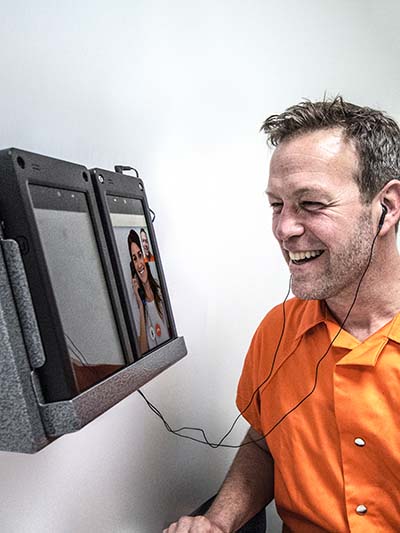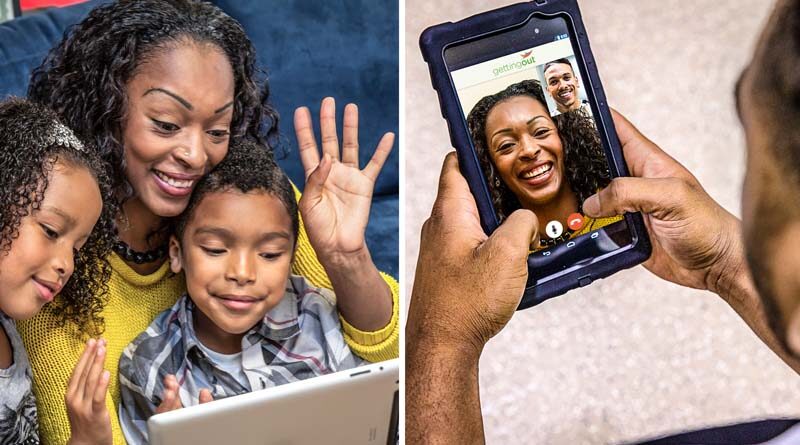GTL Technology – Transforming Facilities Before, During, and After COVID-19
Correctional facilities are rethinking numerous processes that have been affected or shut down due to the coronavirus (COVID-19) pandemic. Across the country, facilities are working to adapt for the wellbeing of all they serve. Visitation was one process that affected all three correctional stakeholders—incarcerated individuals, family and friends, and facility staff.
When anything happens that affects in-person visitation——alternatives are necessary to ensure connection remains between families and that relationships remain strong. Consistent communication and a strong support network are key for helping incarcerated individuals successfully navigate incarceration and reenter society.
For over a decade, GTL has worked to refine its video visitation offering, ensuring that a comprehensive solution meets the needs for all visitation types. GTL now offers both scheduled and on-demand remote video visitation, allowing families to virtually connect and “see” each other whenever necessary, which offers reassurance during these uncertain times. Remote video visitation means that a family member uses their own computer, smartphone, or tablet device to make the video call.
 Video visitation benefits everyone touched by it. For incarcerated individuals, loved ones can be seen instead of just heard. For family and friends, it is an easy way to increase frequency of contact. For facilities, it offers a higher level of safety and control. It is especially beneficial since social distancing and thorough sanitizing procedures might be overwhelming to facilities whose lobby is crowded with visitors that need to be patted down, walked through metal detectors, and placed in a waiting or visitation room for extended periods of time. However, with remote video visitation, friends and family members can see and speak with an incarcerated loved one more often and from the safety and convenience of their own home. Whether in-person visitation is available or not, there are plenty of advantages to video technology.
Video visitation benefits everyone touched by it. For incarcerated individuals, loved ones can be seen instead of just heard. For family and friends, it is an easy way to increase frequency of contact. For facilities, it offers a higher level of safety and control. It is especially beneficial since social distancing and thorough sanitizing procedures might be overwhelming to facilities whose lobby is crowded with visitors that need to be patted down, walked through metal detectors, and placed in a waiting or visitation room for extended periods of time. However, with remote video visitation, friends and family members can see and speak with an incarcerated loved one more often and from the safety and convenience of their own home. Whether in-person visitation is available or not, there are plenty of advantages to video technology.
In many facilities, video visitation is conducted over GTL tablets, which also provide free resources that allow incarcerated individuals to improve themselves and work toward success such as educational courses, substance abuse treatment programs, content focused on reflection and peace, and more. With visitors and interaction severely limited due to the health situation, tablets are still able to provide programming when teachers, therapists, and more are barred from the facility. These resources help to ease the transition from incarceration to reentry, and they are especially useful for returning citizens who need support when entering a world filled with uncertainty.
These resources, and the changed facilities and lives they help to impact, underscore the importance of utilizing technology to make a positive impact. Technology benefits every single person who is affected by incarceration—from individuals in facilities to the family and friends left behind to the officers responsible for overseeing facilities. GTL works to connect these groups with the resources and support necessary to achieve success. Video visitation, tablets, and other intuitive technology solutions are imperative to facilitating meaningful connections and providing opportunities that were not or could not be provided previously. Technology provides second chances—second chances at relationships, second chances at education, second chances at life.
This article is designated as Branded Content and Correctional News does not ensure the veracity or accuracy of the information included within.

